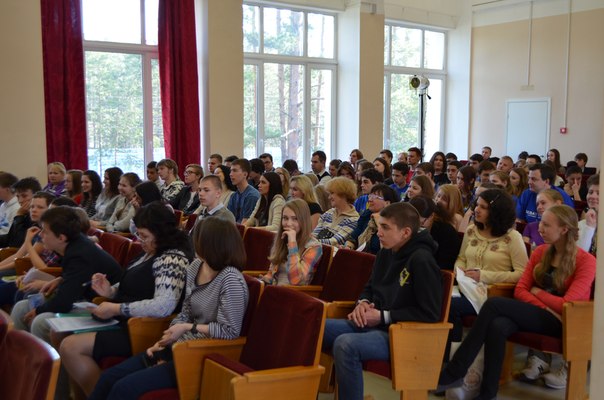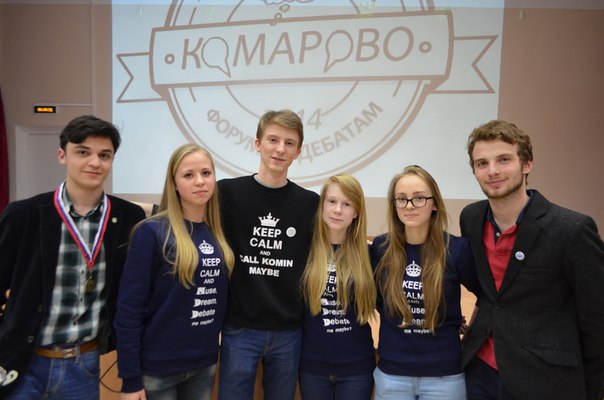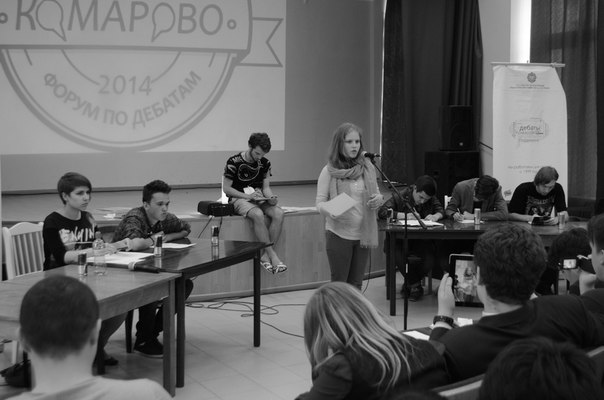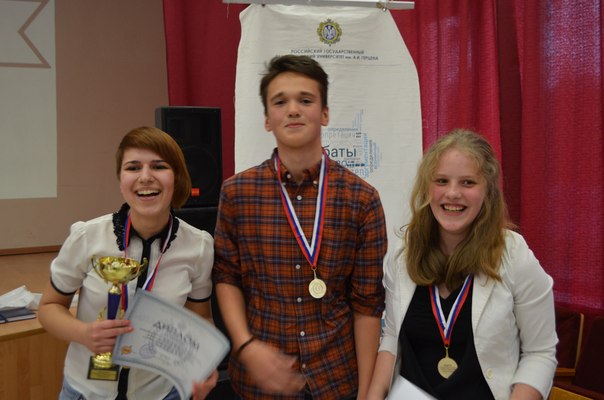|
|
| нет анонсов Все анонсы » |
|
24 ноября 2022
22 ноября 2022
21 ноября 2022
17 ноября 2022
17 октября 2022
11 октября 2022
03 октября 2022
Архив »
|
|
|
 |
| РГПУ им. А.И. Герцена → Общий → Деятельность → Конференции → XX Международный образовательный форум по дебатам «Комарово-2019» → St. Petersburg Komarovo World Schools Debate Invitational
|
St. Petersburg is hosting its annual English-speaking schools debate tournament again!
Herzen University of St. Petersburg and Russian Schools Debate Network are proud to invite you to attend 
2019 St. Petersburg Komarovo World Schools Debate Invitational, to be held 25 — 28 April 2019 The event will be hosted in Komarovo (a suburb of St. Petersburg, Russia) on the shore of the Gulf of Finland — part of Baltic Sea. TOURNAMENT HISTORY: Established in 1996, the Herzen University debate society has a long and esteemed history in the debate community, as well as a reputation for hosting efficient and generally gladdening competitive tournaments and educational debate-related events. Since 1996 we have hosted in Komarovo many national and international events including IDEA Global Youth Forum 2001, International High School Debate Tournaments in 2000 and 2005-2011 attended by the teams and judges from Azerbaijan, Belarus, Czech Republic, Estonia, Germany, Latvia, Lithuania, Poland, Ukraine and USA. Late April is a good time to see one of the most breathtakingly beautiful and magical places on earth, take a boat trip on canals dotted with baroque bridges and debate. We host two to three St. Petersburg City debating tournaments yearly, and can draw upon our experienced members and alumni to provide excellent judging at the tournament. 
TOURNAMENT OVERVIEW: All high schools from all nations involved in World Schools debate format are invited to apply for an invitation to mix high quality debate and preparation for WSDC 2017 in Indonesia and exploration of the spectacular architecture and history of St. Petersburg as well as recreation on the Gulf shore. The St. Petersburg Komarovo World Schools Debate Invitational is a bilingual tournament that offers two separate debating divisions: English-speaking division and Russian-speaking division. Debates conducted in the language of the respective division will feature five rounds in the WSDC format on both prepared and impromptu motions followed by elimination rounds at the quarterfinal/semifinal level and culminating in a final round. The divisions debate the different motions simultaneously . The St. Petersburg Komarovo World Schools Debate Invitational: - Great opportunity to communicate and improve English skills while learning the art of debate
- Meets the standards of International World Schools Style Debating event
- Promotes free speech and international understanding
In order to further these aims, all participating nations and institutions agree that: - The team of any participating nation and region may be required to debate any issue
- The team of any participating nation and region may be required to debate against the team of any other participating nation
- The team of any participating nation and region is entitled to take part in the tournament on the same basis as any other participating nation's team
Essentially we expect a good event both in terms of debating values in World Schools Debate Formats and socially. Participants will take part in sessions on debating held by experienced trainers. Each country/region/institution can submit a squad or several teams of 3-5 students who are over 14 and under the age of 20 to debate social, moral and political issues within the motion area below. 
Equity
All tournaments that the Herzen University Debate Society hosts follow the internationally accepted World Schools Debate Championship Code of Conduct, and as such will have an equity policy and equity officers. More information will be provided about the policy closer to the date of the tournament. GET IN: - by plane. Please consider the flights to Pulkovo international airport (LED) or Helsinki Vantaa (HEL) and Turku Wizzair (TKU) airports. The shuttle service from Finnish airports to Komarovo is 15-40 euro per person. High-speed Allegro trains between Helsinki and Saint Petersburg (3.5 hours, 4 per day, €59-79 for 2nd class). For instance, round-trip flight from Ljubljana to St.Petersburg LED for late April is 230 euro if book now.
- by bus — the cheapest way of reaching Saint Petersburg from neighbouring countries. Two private bus companies (Ecolines and Lux Express) operate routes from Estonia, Latvia, and Lithuania as well as Belarus and Ukraine. From Riga, you can easily find further connections to most of Western Europe, Central Europe, Lithuania, Poland, Ukraine, Belarus, and Moldova. Bus tickets from Tallinn start from 12 euro, from Riga — 13 euro, Vilnius — 17 euro, Warsaw — 40 euro
ARRIVALS/DEPARTURES: please plan your travelling and book your tickets to be in St. Petersburg by 8.30am April 25th or a day earlier. The tournament ends at 2:00pm, April 28th 2019. Rebates on extra nights are available. Please see the Fees section INTERNATIONAL TEAMS: Each delegation should also enter at least one qualified judge (an experienced adult). N-1 rule is recommended but will not be strictly enforced FEES We are not able to offer travel subsidies. Entry fee is per person (ALL inclusive) — there's seldom been a cheaper time to go to Russia for debaters from many countries. The fee is payed in old-fashioned mode — in cash upon arrival. For those, wishing to make wire transfer (SEPA or international) in euros or US dollars a bank account will be provided upon request. This fee amount depends on your accomodation type in: single (99 euro), double (90 euro) and triple rooms (81 euro) at the tournament living and debating center/hotel — both debate venues and living rooms are in the same building. The all-inclusive FEE COVERS: -
Accommodation: THREE (3) nights at the tournament hotel -
Food: THREE (3) full meals per day in cafeteria — authentic homemade Russian cuisine -
TRANSPORTATION: will likely offer St. Petersburg LED airport or bus station pickup for the international teams depending on demand as well as local transportation between Komarovo and St. Petersburg downtown on chartered bus -
ENTERTAINMENT: sports activities, the fireworks show and BBQ break party as well as guided walking tours across St. Petersburg Downtown -
VISAS: For all international participants from EU Schengen Area — visas will be issued by Russian Embassies free of charge. For other countries (e.g. UK, USA), we will try to negotiate the visa fees reduction or even a waiver. -
EXTRA NIGHTS discount — 20% discount for extra-nights prior or after the tournaments if you stay in hostels/hotels in St. Petersburg downtown. REGISTRATION The registration will open on February 14, 2019. There will be a team cap of 20 teams in English-speaking track. We may be able to increase the cap significantly, but we need teams to register as soon as possible. Teams, independent adjudicators and observers can register in English using this form and in Russian using this form. If you need visa (see VISAS section) please register AS SOON AS POSSIBLE.    DEBATE ROUNDS AND MOTIONS:The tournament will take place in the Worlds Schools Debate format. This means that there will be points of information, no cross examinations and the constructive speeches will be 6 minutes long in premilinary rounds — 3 min Replies and 8 minutes long in elimination rounds, 4 min replies. There will be five preliminary rounds, two on prepared motion, and three on impromptu motions, announced at the Tournament, 30-45 minutes prior to the round. The top four teams after the preliminary rounds will advance to the semi-finals. Round 1 will be seeded randomly; subsequent rounds will be power-paired. - PREPARED MOTION I (R1 and R2):
- FINAL ROUND MOTION:
Round I – prepared motion I Round II – prepared motion I Round III – impromptu motion Round IV – impromptu motion Round V – impromptu motion Quarters/Semis – impromptu motion GRAND FINAL — prepared topic II VISAS Countries the citizens of which can travel to Russia without visas are divided into four groups with different requirements and different limitations on length of stay. - Group 1: Azerbaijan, Armenia, Belarus, Kazakhstan, Kyrgyzstan, Moldova, Tajikistan, Turkmenistan, Uzbekistan, Ukraine are permitted to stay in the Russian Federation for up to 90 days without a visa.
- Group 2: Argentina, Brazil, Chile, Colombia, Israel, Nicaragua, Peru, Venezuela. Citizens of these countries are allowed to stay in the Russian Federation without a visa for up to 90 days in each 180-day period, provided they will not be involved in any commercial or work-related activities during their stay.
- Group 3: Cuba, Montenegro, Serbia (with biometric passport), Thailand, Hong Kong SAR (up to 14 days), Macao SAR. Citizens of the countries in this group can stay in the Russian Federation for up to 30 days without a visa.
- Group 4: Bosnia and Herzegovina, Macedonia. Citizens of these Balkan countries can also stay in Russia without a visa for up to 30 days, but must also show an official invitation to immigration officials.
EU members and other countries DO NEED a visa to RUSSIA. But considering support provided by one of our partners — Russian Foreign Ministry is agreed to issue Russian visas for tournament participants from EU country-members FREE OF CHARGE. We work directly with the Russian Consulates abroad to expedite Russian visa applications. However, you need to get an official invitation letter from us that takes some time! All applications for Russian visas must be prepared electronically – a web-based application form is available here: visa.kdmid.ru. (please do it individually for every participant that needs a visa) However before that you should SUBMIT a valid passport scan copy AS SOON AS POSSIBLE for each individual in your delegation to official tournament email — NOTE: Passport should be valid for at least 6 months after the visa expiration date. You will need to have at least two blank Visa pages in your passport. VENUE The Tournament will be held in the Theater Art House Hotel in Komarovo, St.Petersburg - 31 Leitenantov str., St.Petersburg, Komarovo, 197733, RUSSIA.  
Fantastic red-pine forest, sand dunes and beaches of the Gulf of Finland (just 15 minutes walk from the Hotel), pretty lakes, see climate and water from the artesian well makes Komarovo the popular resort in North-Western Russia which is 45km from the city center of St. Petersburg. This is not noisy and luxurious place like Peterhoff or Pushkin with palaces and fountains. It's a quiet place, green in summer and white at winter, where you can still find wooden houses built in «northern modern» style with nice fences around. You could expect to be treated warmly by Russian weather that you could check it here. Be prepared for rather cold weather at night or in the morning! FOR MORE DETAILS: please read WIKIPEDIA article about KOMAROVO SOCIALS Tournament in Komarovo includes its cultural evening activities and the St.Petersburg city tour on the arrival day to explore the beauties of the host city. These are the glue that hold the pieces together, so we offer fun stuff to participate in every evening! It has become a good tradition to host the cultural Expo night. It is an exhibition of anything that is typical for one’s land (city or high) schools, cultures and inhabitants – all kinds of crafts, pictures, info, postcards, toys, food, clothing, etc. It usually ends with dancing and singing together on music that many of you have not heard before. This is a fantastic opportunity to travel around the world and become better acquainted with each other, without ever leaving the Tournament site. Alcoholic drinks can't be shared with the debaters UNDER 18, but are absolutely welcomed among the coaches, trainers, and staff. Additionally debaters have annually the common stereotype that debaters aren’t good at anything else but debating. The hosts like to support this initiative by organizing a Talent show, where all sorts of talents (or not, who’s to judge anyway) are presented. Typically we also play a lot of team-building and get-to-know-each-other games, board games and mafia. We also offer space and opportunity to play sports and do some dancing. Definitely bring some sports shoes/footwear for the volley/hiking on the second and third day of the tournament!As every year, also this year, there will be a guided free city tour for small groups of 5-6 people SCHEDULE More information will be provided about the schedule closer to the date of the tournament. CONTACT INFORMATION You can reach us at any time at: - Official e-mail
- Facebook page
- Make a Viber/WhatsApp call to +79523661747
WORLD SCHOOLS STYLE DEBATING Here is a short overview of the rules: - Each debate comprises eight speeches delivered by two teams of three members, representing the Proposition and Opposition sides. The first six speeches are eight minutes in duration, with each team then finishing up by giving a four-minute concluding Reply Speech.
- Reply speech is a short, four-minute speech given by either the first or second speaker from the team, and presented in the opposite speaking order to the rest of the debate (i.e. the Opposition deliver the first reply speech, followed by the Proposition). The roles of the reply speech are to: outline one or more points of contention that the debate has centred around; evaluate the course of the debate; declare the reasoning of their team's victory.
- During any speech except the reply speeches, members of the opposing team may offer Points of Information to briefly interject a point that the speaker must immediately respond to. The speaker holding the Floor is not obliged to accept all the Points of Information offered to them, but is likely to be marked down by adjudicators if they do not accept any. Speakers delivering Points of Information are expected to keep them to 15 seconds or less. The first and last minute of each main speech, as well as the entire duration of reply speeches, are «protected time», meaning that no Points of Information may be offered.
SPEAKING ORDER AND TIMING: First speaker of the Proposition — 8 minutes
First speaker of the Opposition — 8 minutes
Second speaker of the Proposition — 8 minutes
Second speaker of the Opposition — 8 minutes
Third speaker of the Proposition — 8 minutes
Third speaker of the Opposition — 8 minutes
Reply speaker of the Opposition — 4 minutes
Reply speaker of the Proposition — 4 minutes The Roles of the Speakers - The debate begins with a speaker whose arguments are entirely new. As it goes on, more and more time is spent dealing with what has been said by previous speakers, and less and less comes in that is new. By the end of the debate there is no new argument, and the speakers deal only with what has gone before. If you were to graph this, there would be a line dropping from 100% new matter at first government to almost 0% at third opposition and replies, and a corresponding line rising from 0% rebuttal at first government to almost 100% rebuttal at third opposition and replies.
- The first government speaker defines the motion, outlines the government case, announces the case division, and presents her or his part of the case.
- The first opposition speaker deals with the definition if it is a problem, explains the important differences between the two team cases, and either outlines the opposition case, announces the case division, and presents her or his part of the case, or outlines the opposition's rebuttal case (i.e. the broad themes the opposition will use throughout the debate to rebut the government case) and expands on it. The difference between these two approaches depends on whether the opposition is content just to present a rebuttal case, or takes the stronger route and presents its own alternative case as well.
- The second government speaker defends the government definition (if required) and case from the opposition attacks, rebuts the opposition case, and proceeds with her or his part of the government case. Somewhere around 2 to 3 minutes into the speech the speaker will turn from attacking the opposition to presenting the new part of the argument.
- The second opposition speaker does much the same as the second government, If the opposition is presenting its own alternative case as well, this speaker will turn from attacking the government to presenting the new part of the argument somewhere around 3 to 4 minutes into the speech.
- The third government speaker is going to spend a large part of her or his time attacking the other side. However, she or he can have a small part of the government case to present — Perhaps 1 or 2 minutes at the most. This is not obligatory, although many teams do it.
- The third opposition speaker is going to spend most of her or his time attacking the other side, rather than presenting significant new arguments, She or he can have an even smaller part of the opposition case to present, but again this is not obligatory. Note that the opposition reply follows straight on from this speech, so it is better for the third opposition to deal with the detail of the government case and leave the broad overview to the reply speech.
- The reply speeches are not going to delve into fine detail, but will take a broad approach to the issues of the debate. They should also summarize their own case either as part the analysis of the issues or towards the end of the speech as a separate section. For obvious reasons the reply speeches cannot introduce new arguments. Not only is this unfair but a complete misunderstanding of the role of reply speeches The reply speech is a summing up of the whole debate, not a chance to introduce new ideas.
|
|
Последнее изменение: 7 мая 2018 г. в 22:36:10
Автор:
|
|
|
|
|
|
 |
|
|
|
|
|
01 декабря 2022
01 декабря 2022
01 декабря 2022
30 ноября 2022
30 ноября 2022
Архив »
|
|
|

